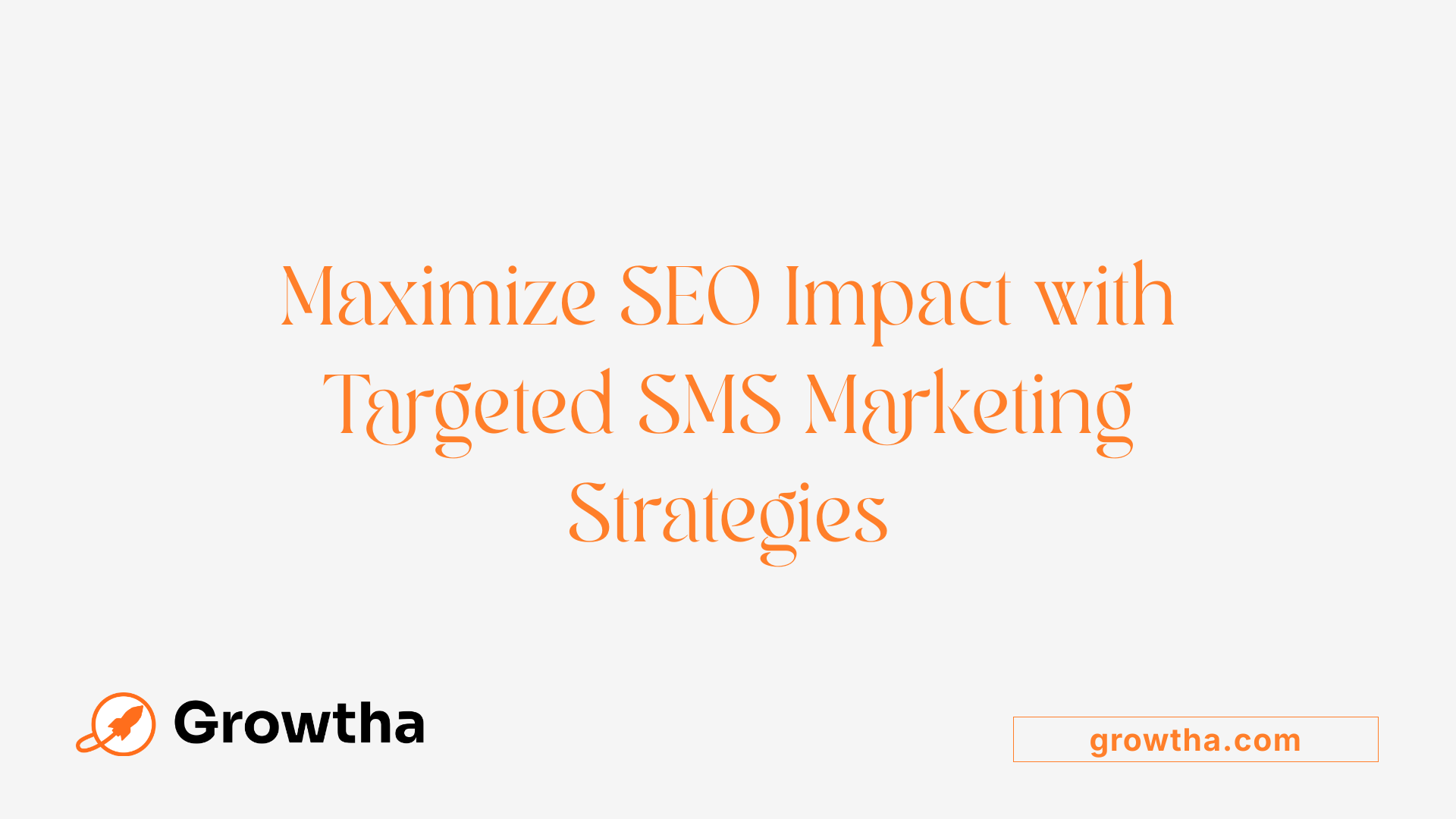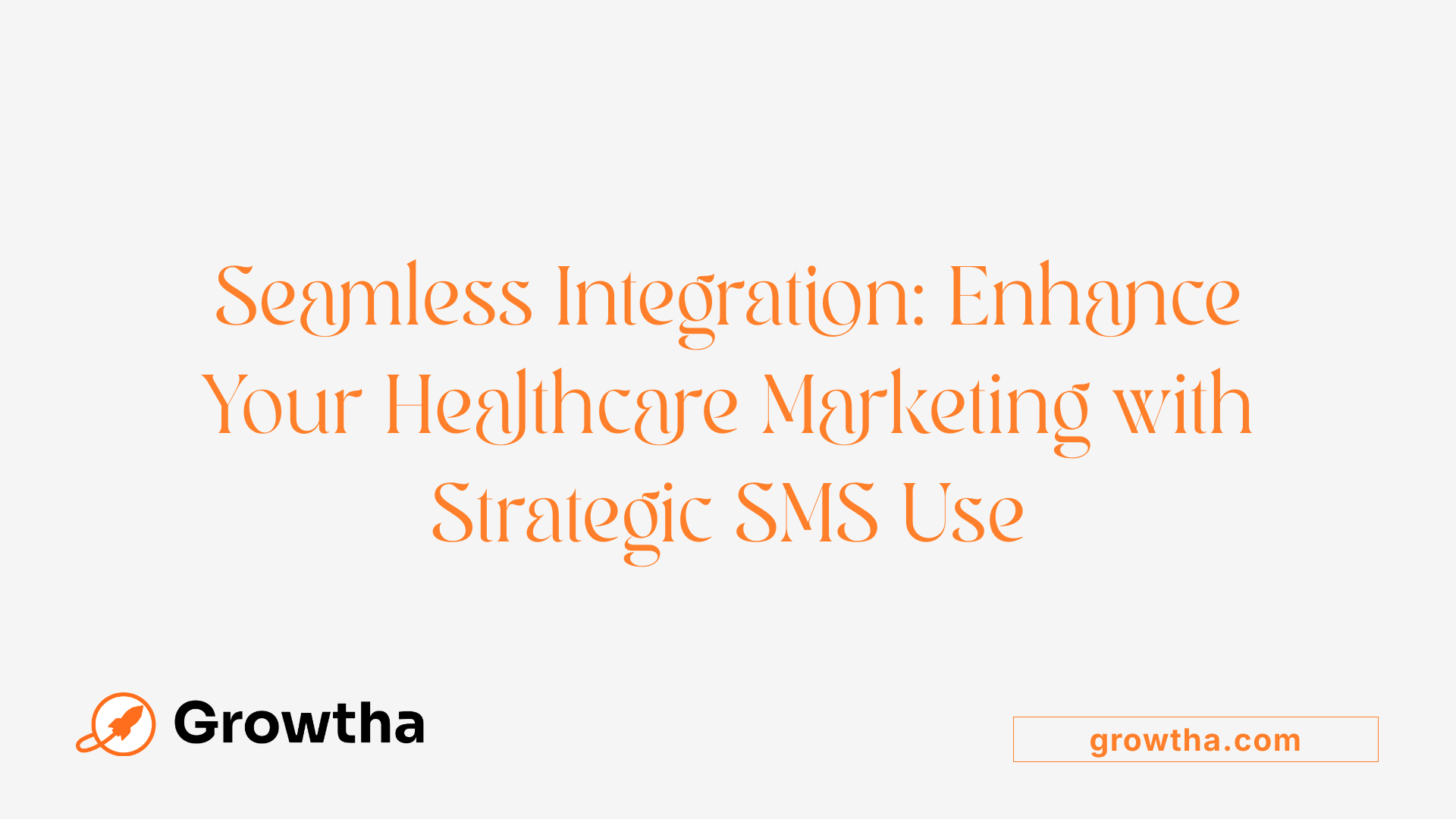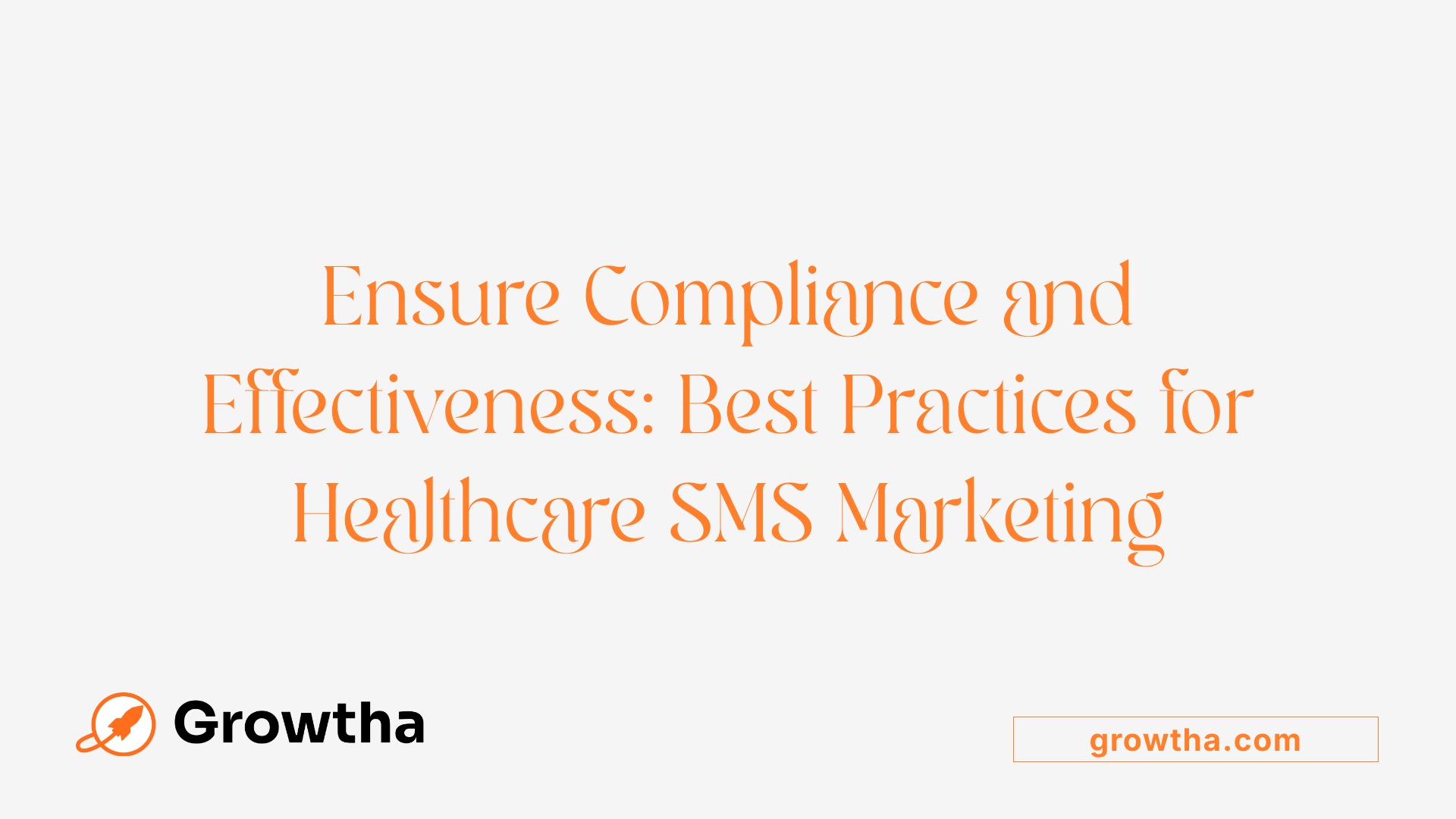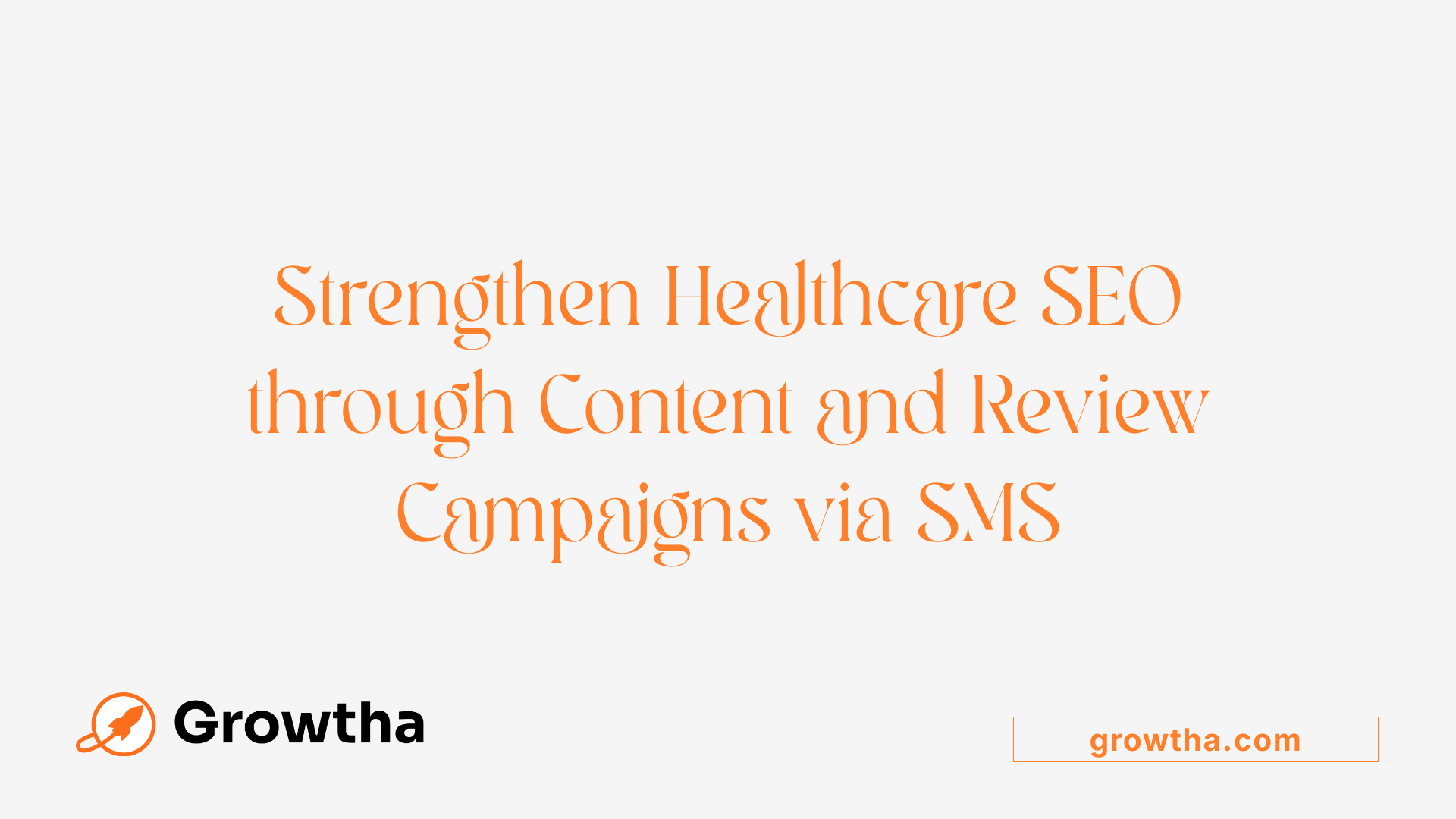In today’s digital-first environment, healthcare providers increasingly rely on innovative marketing channels to boost their online presence and patient engagement. Among these, SMS marketing stands out due to its extraordinary open rates and immediacy. This article explores how SMS marketing can support healthcare SEO goals, enhance online visibility, and integrate seamlessly with broader digital marketing efforts.

SMS marketing plays a pivotal role in advancing healthcare SEO strategies by fostering stronger patient engagement and consistent communication. When healthcare providers send targeted, relevant messages—such as appointment reminders, health tips, or alerts—they encourage patients to interact more regularly with their online platforms. This increased interaction can generate more positive reviews and feedback, which are influential in boosting online reputation and search rankings.
Moreover, the high open rates of SMS messages—up to 98%—ensure that critical information reaches patients swiftly, prompting immediate responses and fostering trust. Personalized SMS campaigns drive patients to websites and social media pages, increasing traffic and engagement metrics that search engines factor into their algorithms.
Furthermore, SMS marketing supports SEO efforts by reinforcing informational content such as health education, service promotions, and post-visit surveys. These activities increase relevant content creation and dissemination, making the healthcare provider more visible and authoritative online. Overall, integrating SMS marketing into healthcare digital strategies not only improves direct patient communication but also enhances the healthcare organization’s online presence, authority, and rankings.
The high open rate of text messaging, approximately 98%, and the fact that over 99% of messages are read within five minutes underscore its effectiveness as a communication channel. This immediacy ensures that patients receive timely reminders, urgent alerts, and health information, which significantly improves adherence to appointments, medication regimens, and health advice.
High open rates translate into higher patient engagement levels, fostering trust and consistent interaction with healthcare organizations. For SEO purposes, this active engagement is vital as it indicates to search engines that the healthcare provider maintains an engaged and responsive online community. This activity can lead to better search rankings, increased visibility, and enhanced reputation online.
By leveraging SMS for quick dissemination of important health updates and personalized communication, healthcare providers can maintain a dynamic online presence that positively influences their search engine performance, ultimately attracting more local patients and establishing a trusted healthcare brand.

SMS marketing plays a crucial role in boosting the online presence of healthcare organizations while simultaneously fostering stronger patient engagement. One of its most significant advantages is its ability to encourage patients to leave reviews and provide feedback. When patients receive timely, personalized messages about their appointments, test results, or wellness tips, they are more likely to share their experiences online, such as on review sites or social media platforms. This not only enhances the healthcare provider’s visibility but also builds credibility and trustworthiness.
In addition, SMS delivers direct, immediate communication that keeps patients informed and involved in their healthcare journey. For example, appointment reminders, medication prompts, and health education tips are sent straight to patients’ mobile phones. The high open rate—over 98% with most messages read within minutes—ensures important information is received and acts as a prompt for patients to engage proactively with their health. This immediacy reduces missed appointments, supports adherence to treatments, and encourages patients to stay connected with their providers.
Furthermore, SMS campaigns can include links to online content, booking portals, or feedback surveys, which help to direct traffic to a healthcare provider's website. When well-designed, these messages support search engine optimization (SEO) efforts by increasing website visits, generating backlinks, and encouraging user interactions. Such interactions signal to search engines that the site has valuable content, which can improve its ranking and visibility.
Compliance with regulations like HIPAA is critical, and modern SMS platforms are equipped with encryption and security features to protect patient data. These secure communications foster a sense of safety and trust, leading to more open and honest interactions. Overall, SMS marketing acts as a cost-effective, efficient tool—delivering personalized, urgent, and educational content that enhances both online visibility and patient involvement.
Encouraging patient reviews and feedback is essential for online reputation management. Healthcare providers often use SMS to request feedback post-visit or after treatment, making it convenient for patients to respond. Short surveys or simple review links embedded in messages enable quick responses, increasing the likelihood of receiving actionable insights.
Positive reviews collected via SMS can significantly influence prospective patients searching for healthcare providers locally. They serve as social proof and boost the organization’s profile on review platforms and social media.
The direct and transparent communication facilitated by SMS enhances patient trust. When patients receive timely updates and see that their healthcare provider is proactive in managing their health, they tend to develop a stronger sense of loyalty and confidence.
Proactive communication through SMS—such as reminders about upcoming screenings or health tips—empowers patients to take charge of their health. This ongoing engagement not only improves health outcomes but also forms the foundation of a long-term patient-provider relationship.
Aspect Benefit Supporting Details Online visibility Increased patient reviews and online interactions Review requests embedded in SMS alongside links to review sites Patient engagement Immediate delivery of health info and reminders High open/read rates, encouraging proactive health management Patient trust Transparent, timely communication Builds confidence, encourages loyalty Data collection Feedback and health data gathering Secure, compliant messages support ongoing care and insights SEO support Website traffic and local search rankings Links and interactions generated from SMS campaigns

Integrating SMS marketing into healthcare digital strategies requires a thoughtful approach that combines personalization, automation, and multi-channel coordination. Healthcare providers should begin by segmenting their patient lists based on demographics, health conditions, or service history. This segmentation allows for tailored messages that are relevant and timely, increasing engagement and response rates.
Personalization is crucial; using patient data to craft customized messages — such as appointment reminders, health tips, or medication prompts — can significantly improve patient trust and adherence.
Automation plays a vital role in streamlining communication workflows. Setting up automatic reminders for upcoming appointments or medication schedules reduces no-shows and enhances care continuity. Two-way SMS capabilities enable patients to respond with questions, reschedule appointments, or provide feedback, fostering an interactive relationship.
Combining SMS with other digital channels enhances overall outreach. For example, a healthcare organization can synchronize SMS alerts with email campaigns or social media posts to deliver consistent messaging across platforms. This multi-channel approach ensures wider reach and reinforces key health messages.
Compliance with healthcare regulations like HIPAA (Health Insurance Portability and Accountability Act) is non-negotiable. Secure messaging platforms that encrypt sensitive information and obtain explicit patient consent are essential to maintain trust.
Finally, measuring metrics such as response and opt-out rates helps optimize campaign performance. Tracking these indicators allows healthcare marketers to adjust message content, frequency, and timing for maximal impact.
Emerging innovations, including AI-driven chatbots embedded in two-way SMS conversations and virtual queuing systems, can further enhance patient engagement and operational efficiency. These tools enable quick, personalized responses and streamline appointment management, positioning SMS as a powerful component of an integrated healthcare marketing framework.

In healthcare, SMS marketing can be a highly effective way to communicate with patients, but it must be executed carefully to comply with legal and ethical standards. The foundation of good practice is obtaining explicit consent from patients before sending any messages. This ensures respect for patient privacy and aligns with regulations such as HIPAA.
Using secure, HIPAA-compliant platforms to send messages is paramount. These platforms typically include encryption features and strong security measures to protect sensitive health information. When crafting messages, healthcare providers should keep them concise and relevant, focusing on personalized content that resonates with individual patient needs. Personalization can include using the patient's name or referencing specific health concerns without revealing protected health information.
Timing is another critical aspect. Messages should be sent at appropriate times to maximize engagement without causing inconvenience or privacy breaches. For example, sending appointment reminders early in the day or health tips during reasonable hours is best. Clear options for patients to opt out or manage their subscription preferences must be provided to ensure voluntary participation.
Two-way communication enhances engagement — allowing patients to confirm appointments, ask questions, or provide feedback directly via SMS. This real-time interaction improves patient satisfaction and operational efficiency. Regularly tracking response metrics such as open rates, response rates, and opt-out rates helps healthcare organizations evaluate and refine their campaigns.
Segmenting patient lists based on demographics, health conditions, or previous interactions allows for targeted messaging, making campaigns more relevant and engaging. Additionally, maintaining an up-to-date Reassigned Number Database prevents messages from reaching disconnected or wrong numbers, maintaining both compliance and effectiveness.
Leveraging multimedia messaging (MMS) when appropriate can include images or videos—such as health tips, medication instructions, or forms—which can increase engagement. Automation tools can also streamline routine communications like follow-ups or vaccination reminders, reducing staff workload.
Ultimately, the goal is to foster ongoing, trusted communication that encourages adherence, enhances preventive care, and improves health outcomes—all within a framework that respects patient privacy and complies with applicable laws.

Integrating SMS marketing with other digital platforms such as email, social media, and pay-per-click (PPC) advertising creates a powerful omnichannel approach that boosts healthcare organizations' online presence. Personalized SMS messages, often enriched with multimedia elements, can be tailored to individual patient preferences and delivered in their preferred languages. This personalization increases engagement, encourages actions like appointment bookings or reviews, and directs traffic to healthcare websites.
By synchronizing SMS with social media campaigns and PPC efforts, healthcare providers can reach target audiences more effectively and at the right moments. For instance, SMS alerts about new blog posts, health tips, or promotional offers can include direct links to relevant website content, increasing website visits and dwell time. These visits are viewed positively by search engines, supporting higher rankings.
Additionally, SMS campaigns can prompt patients to leave reviews and ratings, which are crucial for local SEO. Consistent calls-to-action across various channels foster trust and make it easier for patients to engage, share content, and provide feedback. The integration of analytics from SMS, email, and social media helps refine messaging strategies, ensuring that content is relevant, timely, and effective.
Effective branding and clear instructions in all communications incentivize patient actions that signal credibility and relevance to search engines. This, combined with the increased online activity and positive review signals driven through coordinated efforts, enhances local SEO rankings and organic visibility.
Overall, this digital synergy results in heightened patient engagement, better health outcomes, and a stronger online reputation. These factors collectively contribute to improved healthcare SEO performance, making the practice more discoverable and authoritative online.
Looking ahead, healthcare SMS marketing is set to become even more sophisticated and integrated with emerging technologies. One major trend is AI-powered personalization and automation. These tools will analyze patient data and behaviors to craft highly relevant messages, ensuring that each communication feels tailored and timely. This increases engagement, improves patient outcomes, and enhances overall satisfaction.
Another significant development is multimedia messaging, known as MMS. Unlike plain text, MMS allows the inclusion of images, videos, and rich content within messages. Healthcare providers can use this to deliver detailed health tips, instructional videos, or visual aids that support patient education and adherence.
Integration with telehealth services is also on the rise. SMS will serve as a bridge to virtual care, enabling seamless scheduling of virtual visits, sharing of test results, and follow-up appointments without patients needing to leave their homes. This reduces barriers to access and ensures continuous care.
Emerging technologies such as chatbots and virtual queuing are expected to further streamline interactions. Chatbots can handle common queries instantly, while virtual queuing systems can improve patient flow in clinics. These innovations enhance the user experience, leading to higher satisfaction levels.
From an SEO perspective, these advancements will bolster online engagement. Increased content sharing, patient reviews, and interactive elements driven by new technologies can all improve search engine rankings. As patients share their experiences on social media or leave reviews, healthcare organizations can strengthen their online presence.
Overall, the integration of AI, multimedia content, telehealth, and automation into SMS campaigns will help healthcare providers foster deeper patient relationships, improve service delivery, and enhance visibility in search engines. These innovations make healthcare communication more accessible, personalized, and effective, supporting both clinical and digital marketing objectives.
SMS marketing is a powerful tool for healthcare organizations aiming to achieve digital success and strengthen their online presence. Its ability to deliver short, targeted messages directly to patients’ mobile devices results in remarkably high engagement, with open rates nearing 98%. This immediacy ensures that important information such as appointment reminders, health tips, and feedback requests reach patients promptly, fostering trust and improving satisfaction.
Moreover, SMS enhances patient engagement by enabling personalized communication, which encourages more active participation. When integrated with other digital marketing efforts, SMS can support search engine optimization (SEO) by increasing website traffic through links embedded in messages and encouraging patient reviews, both of which boost local search rankings.
The high response rates and quick readability (with over 99% of texts read within five minutes) mean that healthcare providers can communicate urgent updates efficiently, reducing missed appointments and improving health outcomes. By maintaining compliance with privacy laws like HIPAA and GDPR while personalizing content, organizations protect patient information and build long-term trust.
Looking ahead, innovations such as AI-powered personalization and multimedia messaging will enable even more engaging campaigns that reinforce a provider’s online reputation and visibility. When used as part of a broader multi-channel strategy, SMS becomes a critical element in creating a patient-centric, digitally optimized healthcare ecosystem. This integrated approach sustains growth, enhances patient satisfaction, and upholds healthcare organizations’ SEO and overall digital success.
Compliance with legal standards like HIPAA, TCPA, and data security laws is crucial to protect patient privacy and ensure ethical communication. Healthcare providers must secure explicit patient consent, utilize secure messaging platforms, and implement proper encryption and staff training.
Personalization further enhances engagement by tailoring messages based on individual patient data and preferences. Personalized messages are more relevant, increasing response rates and fostering stronger patient-provider relationships. Such targeted communication not only improves health outcomes but also reduces administrative workloads and supports compliance efforts.
Emerging trends point towards AI-driven campaigns that deliver highly personalized, two-way conversations. Multimedia messaging (MMS), virtual queuing, and integration with telehealth services will expand the scope and effectiveness of SMS communication.
Innovations like chatbot integration and AI-based virtual assistants will streamline interactions, support self-service, and deliver timely health information. As technology evolves, SMS marketing will continue to be a cornerstone of healthcare communication, helping organizations build trust, improve health outcomes, and reinforce their digital visibility.
In conclusion, SMS marketing remains an essential component of healthcare digital strategies, combining high engagement, cost-effectiveness, and adaptability. Its role in fostering a connected, patient-centered ecosystem ensures its continued importance in the future of healthcare marketing.
As healthcare providers continue to adopt digital marketing best practices, SMS messaging remains a cornerstone for boosting online visibility and patient engagement. Its unmatched open rates, immediacy, and personalization capabilities make it a versatile channel supporting SEO efforts by driving traffic, generating reviews, and enhancing overall reputation. With compliance measures in place and emerging innovations like AI and multimedia messaging, SMS will continue to evolve as an essential component of healthcare marketing. Establishing a cohesive, multi-channel approach that includes SMS ensures providers remain competitive, trusted, and accessible, ultimately delivering better health outcomes and digital success for years to come.